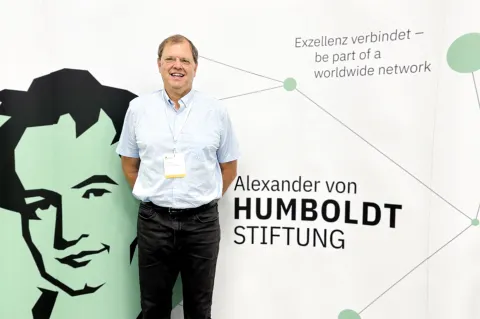
Professor Joel Kostka at the Alexander von Humboldt Foundation annual meeting and reception in Germany this week.
The award will support Kostka’s research on the role of marine plant microbiomes in coastal climate resilience in collaboration with Germany’s Max Planck Institute.
This week, Professor Joel Kostka was awarded the prestigious Humboldt Research Award by the Alexander von Humboldt Foundation during its annual meeting and reception with Germany’s Federal President Steinmeier in Berlin. Every year, the Foundation grants up to 100 Humboldt Research Awards worldwide, which recognize internationally leading researchers of all disciplines.
The award’s €80,000 endowment will support a research trip to Germany for up to a year — during which Kostka will collaborate with Professor Marcel Kuypers, director of the Max Planck Institute for Marine Microbiology in Bremen, Germany — to assess the role of marine plant microbiomes in coastal marine ecosystem health and climate resilience.
Kostka, who holds joint appointments in the School of Biological Sciences and School of Earth and Atmospheric Sciences, is also the associate chair for research in Biological Sciences. He was recently named the inaugural faculty director of Georgia Tech for Georgia's Tomorrow. The new Center, announced by the College of Sciences in December 2024, will drive research aimed at improving life across the state of Georgia.
Wetlands in a changing climate
“Human population is centered on coastlines, and coastal ecosystems provide many services for people,” Kostka says. “Although they cover less than 1 percent of the ocean, coastal wetlands store over 50 percent of the seafloor’s rich carbon reserves.” But researchers aren’t sure how these ecosystems will respond to a changing climate.
Microbes may be the key. Microbes play a critical role in maintaining plant health and helping them adapt to stressors, Kostka says. Similar to human bodies, plants have microbiomes: a community of microbes intimately associated with the plant that help it take up nutrients, stimulate the plant’s immune system, and regulate plant hormones.
“Our research indicates that plant microbiomes are fundamental to wetland ecosystem health, yet almost everything we know about them is from agricultural systems,” he adds. “We know very little about the microbes associated with these important marine plants that dominate coastal ecosystems.”
Kostka’s work in Germany will investigate how microbiomes help coastal marine plants adapt to stress and keep them healthy. From there, he will investigate how plant microbiomes contribute to the carbon and nutrient cycles of coastal ecosystems — and how they contribute to ecosystem resilience.
Expanding collaboration — and insights
One goal of the collaboration is to exchange information on two types of marine plants that dominate coastal ecosystems worldwide: those associated with seagrass meadows and salt marshes.
“I’ve investigated salt marsh plants in the intertidal zone between tides, and my colleagues at the Max Planck Institute have focused on seagrass beds and seagrass meadows, which are subtidal, below the tides,” Kostka says. “While these two ecosystems have some different characteristics, they both cover large areas of the global coastline and are dominated by salt-tolerant plants.”
In salt marshes, Kostka has shown that marine plants have symbiotic microbes in their roots that help them to take up nitrogen and deal with stress by removing toxic sulfides. He suspects that these plant-microbe interactions are critical to the resilience of coastal ecosystems. “The Max Planck Institute made similar observations in seagrass meadows as we did in salt marshes,” Kostka explains. “But they found different bacteria.”
From Georgia to Germany
Beyond supporting excellence in research, another key goal of the Humboldt Research Award is to support international collaboration — something very familiar to Kostka. “I've been working with Professor Kuypers and the Max Planck Institute in Bremen for many years,” he says, adding that he completed his postdoctoral research at the Institute. “Max Planck's labs are some of the best in the world for what they do, and their imaging technology can give us an unprecedented look at plant-microbe interactions at the cellular level.”
“This project is also special because I am collaborating with other scientists in northern Germany,” Kostka adds. “The University of Bremen is home to the Center for Marine Environmental Sciences (MARUM), which is designated as a Cluster of Excellence by the German National Science Foundation, so there are a number of fantastic research centers in Bremen to work with.”
His hope is that this project will deepen collaboration between the research at Georgia Tech and research in Germany. “I look forward to seeing what we can uncover about these critical systems while working together.”